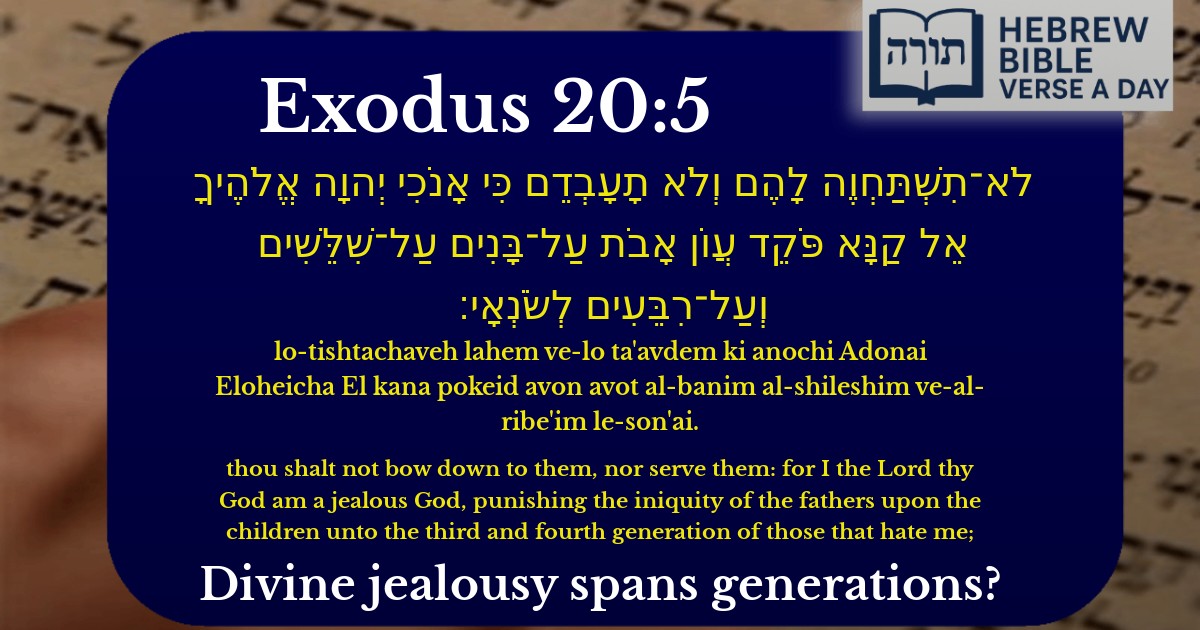Join Our Newsletter To Be Informed When New Videos Are Posted
Join the thousands of fellow Studends who rely on our videos to learn how to read the bible in Hebrew for free!
Hebrew Text
לֹא־תִשְׁתַּחְוֶה לָהֶם וְלֹא תָעָבְדֵם כִּי אָנֹכִי יְהוָה אֱלֹהֶיךָ אֵל קַנָּא פֹּקֵד עֲוֺן אָבֹת עַל־בָּנִים עַל־שִׁלֵּשִׁים וְעַל־רִבֵּעִים לְשֹׂנְאָי׃
English Translation
thou shalt not bow down to them, nor serve them: for I the Lord thy God am a jealous God, punishing the iniquity of the fathers upon the children unto the third and fourth generation of those that hate me;
Transliteration
Lo-tishtachaveh lahem ve-lo ta'avdem ki anochi Adonai Eloheicha El kana pokeid avon avot al-banim al-shileshim ve-al-ribe'im le-son'ai.
Hebrew Leining Text
לֹֽא־תִשְׁתַּחֲוֶ֥֣ה לָהֶ֖ם֮ וְלֹ֣א תׇעׇבְדֵ֑ם֒ כִּ֣י אָֽנֹכִ֞י יְהֹוָ֤ה אֱלֹהֶ֙יךָ֙ אֵ֣ל קַנָּ֔א פֹּ֠קֵ֠ד עֲוֺ֨ן אָבֹ֧ת עַל־בָּנִ֛ים עַל־שִׁלֵּשִׁ֥ים וְעַל־רִבֵּעִ֖ים לְשֹׂנְאָֽ֑י׃
לֹֽא־תִשְׁתַּחֲוֶ֥֣ה לָהֶ֖ם֮ וְלֹ֣א תׇעׇבְדֵ֑ם֒ כִּ֣י אָֽנֹכִ֞י יְהֹוָ֤ה אֱלֹהֶ֙יךָ֙ אֵ֣ל קַנָּ֔א פֹּ֠קֵ֠ד עֲוֺ֨ן אָבֹ֧ת עַל־בָּנִ֛ים עַל־שִׁלֵּשִׁ֥ים וְעַל־רִבֵּעִ֖ים לְשֹׂנְאָֽ֑י׃
🎵 Listen to leining
Parasha Commentary
📚 Talmud Citations
This verse is quoted in the Talmud.
📖 Sanhedrin 27b
The verse is discussed in the context of divine justice and the concept of punishment extending to future generations, with rabbinic interpretations on the limits and conditions of this principle.
📖 Yoma 86b
Cited in a discussion about repentance and God's mercy, contrasting the verse's mention of punishment with other verses that speak of God's kindness to thousands of generations.


Prohibition Against Idolatry
The verse (Exodus 20:5) prohibits bowing down to or serving idols, emphasizing the exclusive worship of Hashem. Rashi explains that "לֹא־תִשְׁתַּחְוֶה לָהֶם" (thou shalt not bow down to them) refers to any act of prostration, even if not intended as worship, while "וְלֹא תָעָבְדֵם" (nor serve them) forbids performing any service typically associated with idolatrous practices. The Rambam (Hilchot Avodah Zarah 3:6) elaborates that these prohibitions include any gesture that might be construed as reverence toward false deities.
Divine Jealousy and Justice
The phrase "כִּי אָנֹכִי יְהוָה אֱלֹהֶיךָ אֵל קַנָּא" (for I the Lord thy God am a jealous God) underscores Hashem's intolerance of idolatry. The Midrash (Shemot Rabbah 29:5) teaches that this "jealousy" reflects His deep relationship with Bnei Yisrael—just as a spouse demands exclusive loyalty, so too does Hashem. The Sforno adds that this jealousy is not arbitrary but rooted in divine truth, as idolatry distorts humanity's understanding of the Creator.
Punishment Across Generations
The latter part of the verse describes consequences for those who reject Hashem: "פֹּקֵד עֲוֺן אָבֹת עַל־בָּנִים" (punishing the iniquity of the fathers upon the children). The Talmud (Sanhedrin 27b) clarifies that this applies only when descendants continue the sinful ways of their ancestors, as implied by "לְשֹׂנְאָי" (those that hate Me). Rashi emphasizes that divine mercy far outweighs punishment, as the very next verse (Exodus 20:6) promises kindness for thousands of generations to those who love Hashem.
Key Teachings from Commentators